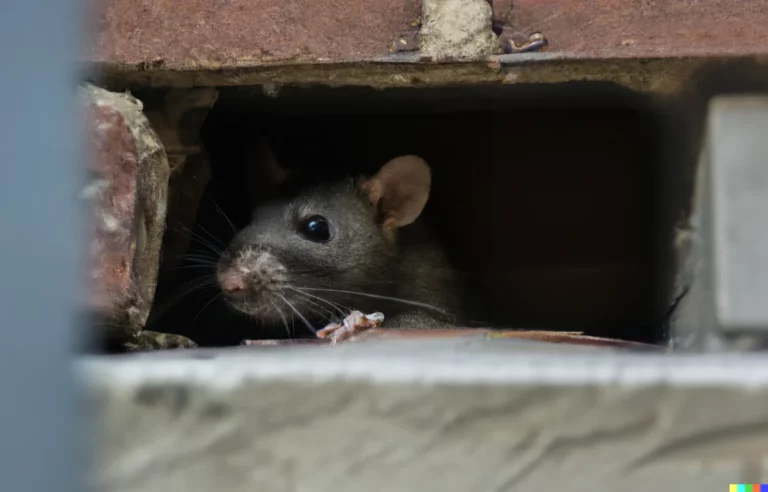Table of Contents
ToggleSince rats are scavenging rodents, residential and commercial kitchens tend to attract them. As carriers of various diseases, they pose significant health risks, especially in areas designated for food preparation.
Even the minutest food particles can nourish these rodents. Prompt and efficient disposal of food waste may help prevent rat infestations in the kitchen.
Rats are notorious for their ability to gnaw through resilient surfaces, such as wood. This often results in substantial damage to food storage areas like pantries and cupboards. Particularly, containers made of soft plastic or cardboard are prone to this damage. Therefore, keeping food in glass or metal containers is advisable.
How Do Rats Enter Your Property?
If your garden harbors rats, they might venture into your property through open doors or windows. Additional entry points include damaged air bricks, wall vents, and faulty drains. They can even infiltrate via the roof, particularly where extensions have created gaps between the ceilings and walls. Inspecting and repairing these potential entrances is crucial.
Other entry points include:
- Open windows and doors
- Gaps or holes in floors and walls
- Spaces under doors
- Pet flap doors
- Drains and pipes
- Roof openings
- Air vents
What Attracts Rats to Your Kitchen?
Rats can compress their bodies to squeeze through narrow spaces. Kitchen areas beneath units are appealing as they offer unseen living spaces. Uncovered food left on countertops overnight is particularly enticing. Rats will typically take stolen food back to a secure place to hoard.
If undetected, rats can inhabit and breed in your kitchen space. Like other pests and animals, rats seek water, food, and shelter. Given that kitchens store food, it’s unsurprising that rats often invade this area. They can infiltrate your pantry, gnaw through food boxes, and consume items like cereal and biscuits.
Other attractants for rats include:
- Food left out on kitchen counters or tables
- Leaking faucets or pipes for drinking water
- Accessible garbage cans
- Pet food and water
How to Prevent a Rat Infestation?
The risks associated with rats are considerable. Their capacity to transmit deadly diseases to humans is a serious concern. Additionally, their tendency to chew on electrical cords can lead to power outages. Repairing damages to your electrical or piping systems can be costly and hazardous.
Rats can also inflict structural damage to your home by gnawing on walls and floorboards. Rats are a pervasive issue worldwide. Consider the following precautions:
- Ensure no accessible dripping taps as rats require a regular water supply.
- Cover and store food leftovers.
- Empty bins regularly to prevent attracting rats with smells.
- Inspect behind appliances and check flooring by skirting boards.
- Seal any discovered holes or use other natural deterrents against rats and mice.
- Replace any damaged floorboards.
- Examine old sewers under your home.
- Seal holes around sink waste pipes that can provide rats access from wall cavities.
- You can also try home remedies such as strategically placing hot peppers or garlic.
How to Address a Rat Problem?
Dealing with a rat infestation involves important decisions. First and foremost, we at On Demand Pest Control help determine the most effective method for eradication. We also consider strategies to prevent future invasions. Our methods are thorough and comprehensive, ensuring the complete elimination of these unwelcome intruders.
The process begins with an assessment of the infestation’s scale. Small infestations might be manageable using DIY methods such as traps, rat poison, or natural deterrents. Regular inspection and cleaning can keep the situation under control. However, a significant infestation can be daunting for those not trained in pest management.
In situations where personal management seems insufficient, we are ready to assist. We have the knowledge and tools to tackle infestations effectively and safely. We offer reliable, efficient, and tailored solutions to your pest problems.
Our team consists of trained technicians who are well-versed in various extermination methods. We prioritize health and safety, ensuring strict adherence to safety standards in all our procedures. Our aim is to minimize disruption to your daily life while we address the infestation.
To achieve this, our technicians conduct a thorough inspection of your property to identify the extent and specific species involved. We then develop a comprehensive action plan tailored to your unique situation.
We also believe in empowering our customers with knowledge. We provide free advice on preventive measures and maintenance practices to help keep your property rat-free in the future. This support and guidance enable you to make informed decisions regarding the management of the infestation.




